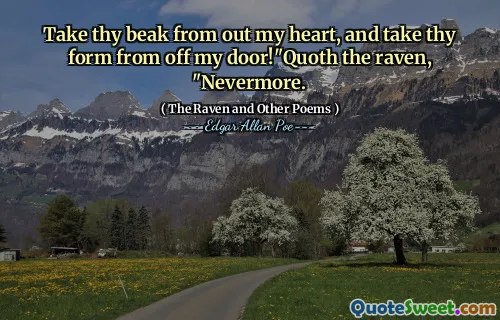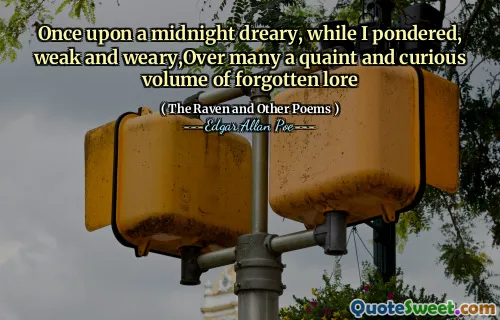"The Raven and Other Poems" is a compilation of works by Edgar Allan Poe, showcasing his mastery of the macabre and the fantastic. The collection is highlighted by the titular poem, "The Raven," which explores themes of grief, loss, and despair through the haunting visit of a mysterious raven that personifies sorrow. The poem’s rhythmic quality and repetition create a dark, atmospheric feel that has captivated readers since its publication.
In addition to "The Raven," the book features several other poems, each demonstrating Poe's distinctive style and his ability to evoke deep emotions. Works such as "Annabel Lee" delve into love and loss, while "The Bells" plays with sound and structure to convey the passage of time and the inevitability of fate. Poe's use of vivid imagery and lyrical language enriches these themes, inviting readers into a world where beauty and tragedy coexist.
Overall, "The Raven and Other Poems" remains a seminal work in American literature, showcasing the intricate interplay of music, emotion, and existential themes. Poe's influence can be seen in various literary movements, and his exploration of the darker sides of human experience resonates with audiences today. This collection not only cements his legacy as a master poet but also continues to inspire new generations of writers and poets.
More »
Today Birthdays
1919 -
J. D. Salinger
1974 -
Ally Carter
1879 -
E. M. Forster
1968 -
Mark Lawrence
1839 -
Ouida
1958 -
Hamza Yusuf
1924 -
Charlie Munger
1897 -
Catherine Drinker Bowen
1940 -
Leonard Susskind
1767 -
Maria Edgeworth
1915 -
John Henrik Clarke
1864 -
Alfred Stieglitz
1863 -
Pierre de Coubertin
1716 -
William Wycherley
1874 -
Frank Knox
1956 -
Christine Lagarde
1972 -
Asghar Farhadi
1934 -
Lakhdar Brahimi
1953 -
Gary Johnson
1973 -
Saffron Burrows
1968 -
Cat Cora
1966 -
Ivica Dacic
1975 -
Ayman Odeh
1745 -
Anthony Wayne
1940 -
Frank Langella
1947 -
Jon Corzine
1895 -
J. Edgar Hoover
1922 -
Fritz Hollings
1826 -
Robert Rainy
1963 -
Laura Ingraham

